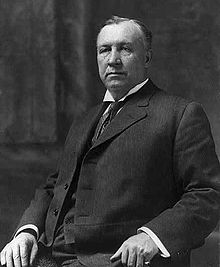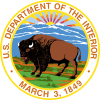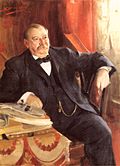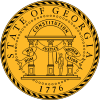- M. Hoke Smith
-
For the former president of Towson University, see Hoke L. Smith.For other people named Michael Smith, see Michael Smith (disambiguation).
Michael Hoke Smith 
19th United States Secretary of the Interior In office
March 6, 1893 – September 1, 1896Preceded by John Willock Noble Succeeded by David R. Francis Personal details Born September 2, 1855
Newton, North Carolina, U.S.Died November 27, 1931 (aged 76)
U.S.Political party Democratic Spouse(s) Marion "Birdie" Cobb Smith Profession Politician, Lawyer Michael Hoke Smith (September 2, 1855 – November 27, 1931) was a newspaper owner, United States Secretary of the Interior (1893–1896), 58th Governor of Georgia (1907–1909,1911), and a United States Senator (1911–1920) from Georgia.
Biography
Smith was born in Newton, North Carolina, and moved to Georgia in 1872 with his parents. He was primarily educated by his father, a professor at the University of North Carolina at Chapel Hill. His uncle was Civil War General Robert Hoke. Smith passed the bar examination in 1873 and became a lawyer in Atlanta, Georgia. He maintained a small office in the James building downtown. His practice began to grow when he began to argue injury suits.[1] As his practice grew, he brought in his brother Burton in 1882, also excellent in front of juries, and they worked together for over 10 years.[2] Their main clients were the many railroad workers injured on the job; three-quarters of the cases they took involved personal injury and they won the bulk of them.[3]
Smith served as chairman of the Fulton County and State Democratic Conventions and was president of the Atlanta Board of Education. In 1887, Smith bought the Atlanta Journal. His strong support in the Journal for Grover Cleveland during the 1892 Presidential election garnered Cleveland's attention and led to a federal job.
Smith was appointed as Secretary of the Interior by Cleveland in 1893. He worked hard to right land patents previously obtained by the railroads, for rationalization of Indian affairs and for the economic development of the South. A staunch defender of Cleveland and his sound money policy, Smith campaigned through-out the country in 1896 for Cleveland candidates. When William Jennings Bryan was selected at the 1896 Democratic National Convention, Smith was in a quandary: could he support the party without supporting the platform? The overwhelming support for silver and Bryan in his home-state of Georgia convinced him to try to have it both ways. His newspaper, the Journal endorsed the candidate but continued to denounce the silver policy. Smith resigned his cabinet post to protect Cleveland.[4]
Smith returned to Atlanta and resumed his lucrative law practice netting around $25,000 per year and slowly rebuilt his local reputation.[5] In April 1900 he sold his interests in the Journal and tried many other investments but the only ones that did well were real estate in the Atlanta area. He was instrumental in organizing the North Avenue Presbyterian Church (which still stands) and was re-elected to the Atlanta Board of Education.[6]
Smith allied himself with Bryan's Vice Presidential candidate, Populist Tom Watson, one of Georgia's most influential politicians. With Watson's support, Smith was elected governor in 1907. In order to gain Watson's support, however, he had to call the Negro vote "ignorant [and] purchaseable." Smith established several Jim Crow laws requiring literacy tests and property ownership for voting. Smith also supported railroad reform and election reform. After losing the support of Watson, he was defeated in the next election by Joseph M. Brown. Smith was re-elected as governor in 1911.
In 1911, while still governor, he was chosen by the Georgia General Assembly to fill out the term of United States Senator Alexander S. Clay. Smith won re-election in 1914, but was defeated by Tom Watson in 1920. Afterward, Smith practiced law in Washington, DC, and Atlanta. He died in 1931 and is buried in Oakland Cemetery in Atlanta, the last surviving member of the Cleveland Cabinet.
Smith was a maternal great-uncle of the Louisiana politician Frank Burton Ellis of New Orleans.
References
- M. Hoke Smith at the Biographical Directory of the United States Congress
- The Strange Career of Jim Crow by C. Vann Woodward, 2nd edition, (Oxford University Press: 1966) pp. 86–91.
Notes
Political offices Preceded by
John Willock NobleUnited States Secretary of the Interior
Served under: Grover Cleveland
1893–1896Succeeded by
David Rowland FrancisPreceded by
Joseph M. TerrellGovernor of Georgia
1907–1909Succeeded by
Joseph M. BrownPreceded by
Joseph M. BrownGovernor of Georgia
1911Succeeded by
John M. SlatonUnited States Senate Preceded by
Joseph M. TerrellU.S. Senator (Class 3) from Georgia
1911–1921Succeeded by
Thomas E. WatsonUnited States Secretaries of the Interior Ewing • McKennan • Stuart • McClelland • Thompson • C Smith • Usher • Harlan • Browning • Cox • Delano • Chandler • Schurz • Kirkwood • Teller • Lamar • Vilas • Noble • M Smith • Francis • Bliss • Hitchcock • Garfield • Ballinger • Fisher • Lane • Payne • Fall • Work • West • Wilbur • Ickes • Krug • Chapman • McKay • Seaton • Udall • Hickel • Morton • Hathaway • Kleppe • Andrus • Watt • Clark • Hodel • Lujan • Babbitt • Norton • Kempthorne • Salazar
United States Senators from Georgia Class 2 Few • Jackson • Walton • Tattnall • Baldwin • Jones • Crawford • Bulloch • Bibb • Troup • Forsyth • Walker • Ware • Cobb • Prince • Troup • King • Lumpkin • Berrien • Charlton • Toombs • H. Miller • Norwood • B. Hill • Barrow • A. Colquitt • Walsh • Bacon • West • Hardwick • Harris • Cohen • Russell • Gambrell • Nunn • Cleland • Chambliss
Class 3 Cabinet of President Grover Cleveland (1893–1897) Vice President Adlai E. Stevenson I (1893–1897)
Secretary of State Walter Q. Gresham (1893–1895) • Richard Olney (1895–1897)Secretary of the Treasury John G. Carlisle (1893–1897)Secretary of War Daniel S. Lamont (1893–1897)Attorney General Richard Olney (1893–1895) • Judson Harmon (1895–1897)Postmaster General Wilson S. Bissell (1893–1895) • William L. Wilson (1895–1897)Secretary of the Navy Hilary A. Herbert (1893–1897)Secretary of the Interior M. Hoke Smith (1893–1896) • David R. Francis (1896–1897)Secretary of Agriculture Julius S. Morton (1893–1897)Categories:- Governors of Georgia (U.S. state)
- United States Secretaries of the Interior
- United States Senators from Georgia (U.S. state)
- Georgia (U.S. state) Democrats
- 1855 births
- 1931 deaths
- People from Catawba County, North Carolina
- The Atlanta Journal-Constitution people
- Democratic Party United States Senators
Wikimedia Foundation. 2010.

